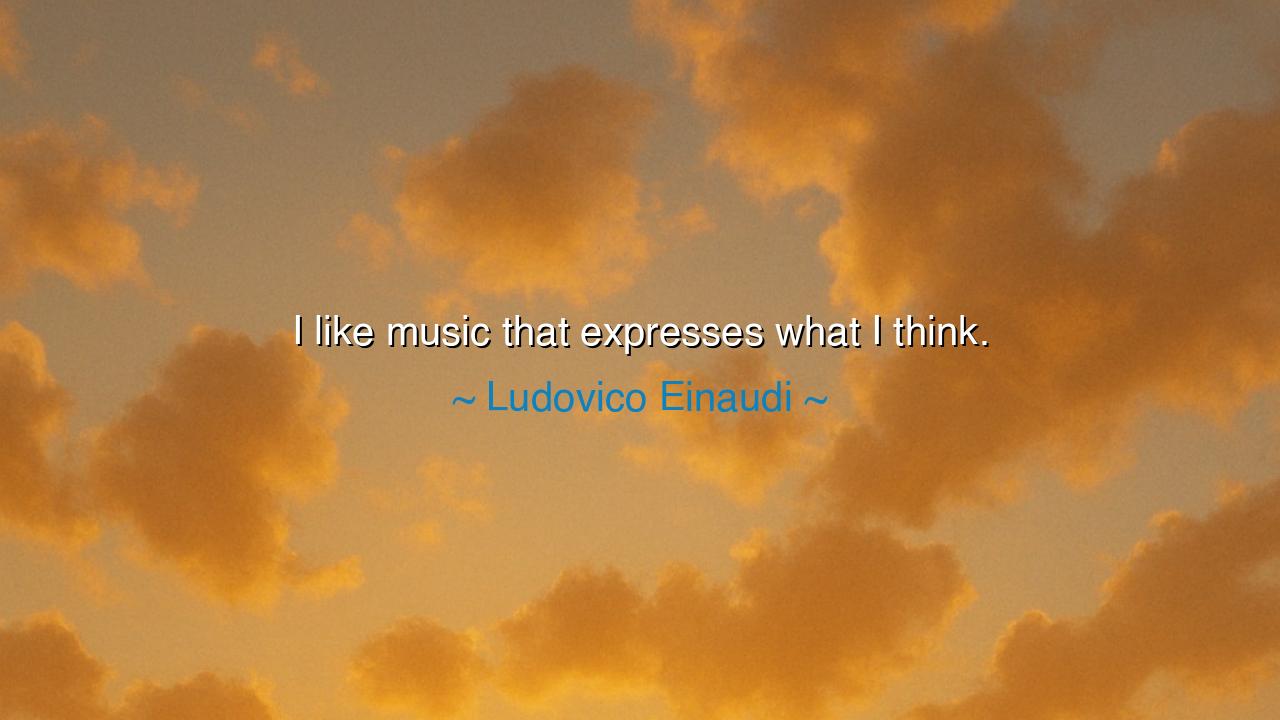
I like music that expresses what I think.






Hear the quiet yet profound words of Ludovico Einaudi: “I like music that expresses what I think.” Simple though they sound, they carry the weight of centuries, for they remind us that true art is not ornament alone, nor empty sound. It is the translation of thought, of vision, of inner truth into a form that others can feel. In this, Einaudi reveals the ancient bond between the mind and the melody—that music is the bridge by which the unspoken becomes living, by which the secret chambers of the soul find voice.
From the dawn of time, thinkers and dreamers have sought such expression. The philosophers of Greece taught that music was not merely entertainment, but the very language of the cosmos. Pythagoras spoke of the “harmony of the spheres,” believing that the movements of the heavens themselves produced a music reflecting divine order. To Einaudi, as to the ancients, music becomes more than sound—it is thought incarnate, an echo of the intellect and the spirit, given life.
Consider Beethoven, who in the silence of his deafness poured his very soul into his compositions. He could no longer hear the world, yet he continued to think in symphonies. His Ninth, written in near total silence, was no mere arrangement of notes; it was the expression of ideas—of unity, of joy, of the brotherhood of man. Through music, he declared what his words and broken hearing could not. His story reveals the power of Einaudi’s quote: the mind finds in melody the perfect vessel for truth.
Einaudi himself is known for weaving simplicity into profoundness. His works, stripped of unnecessary adornment, carry clarity like water from a pure spring. His music does not shout, it does not overwhelm. It whispers the thoughts of stillness, of longing, of vast spaces within and without. In saying that he values music that expresses what he thinks, he calls us to recognize that art must be sincere, born of inner reflection, not created to flatter the ear alone.
The teaching is clear: seek expression, not mere decoration. True music, true art, must carry the weight of thought, the authenticity of soul. If it speaks only to please, it fades; if it carries truth, it endures. The same is true of life itself: what you do should reflect what you think, what you believe. Actions without conviction are noise; actions born of conviction are symphony.
Practical action lies in this: listen to art that reflects truth, not only trend. Surround yourself with voices that stir your deepest thoughts, not merely your shallow pleasures. And when you create—whether in song, in work, in speech—let it reflect your true thinking, your inner convictions. In this way, you live authentically, and your life itself becomes a kind of music, heard and felt by others.
So let these words be carved in the memory of generations: “I like music that expresses what I think.” May they remind you that sound without thought is hollow, and thought without expression is barren. Unite the two, and you hold in your hands the power to move hearts, to shape minds, and to echo through time. For the greatest works of humanity—whether symphonies, poems, or lives well-lived—are nothing less than thought made music.






AAdministratorAdministrator
Welcome, honored guests. Please leave a comment, we will respond soon